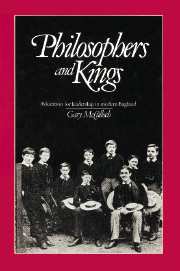5 - The rise and fall of the meritocracy
Published online by Cambridge University Press: 16 November 2009
Summary
The failure of the public school dominated Establishment to avoid the drift to global conflict, and the clear risks involved in producing dynamic leaders like the fascist dictators, produced a decisive reaction in the decades after 1945 against both old and new doctrines of ‘education for leadership’. Eric James's vision of the grammar schools, dubbed ‘meritocratic’ by Michael Young at the end of the 1950s, represented an important but ultimately unsuccessful attempt to adapt to this new situation while retaining key elements of the classic public school purpose.
THE NEW SCHOOL TIE
The dangers of education for leadership, associated on the one hand with Nazism and on the other hand with the ‘old school tie’, appeared one of the most important lessons to be learned from the experience of the second world war. It was symptomatic of this that the educational theories of Plato came under increasing attack in the immediate postwar years as being at least in part responsible for Hitler's notions of the ‘master race’. Even before the beginning of the war there had been important indications of this new mood – Richard Crossman's Plato Today, in 1937, was an uncompromising assault upon the social implications of Plato's thought. After 1945, this kind of rejection of Plato became much more common although, naturally enough, such denunciations remained fiercely contested. Articles by Otto Neurath and J.A. Lauwerys on the resemblance between Plato's Republic and Nazi propaganda met with a mixed reception that included ripostes from philosophers including G.C. Field and C.E.M. Joad.
- Type
- Chapter
- Information
- Philosophers and KingsEducation for Leadership in Modern England, pp. 66 - 81Publisher: Cambridge University PressPrint publication year: 1991



